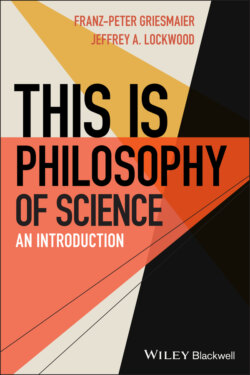Читать книгу This is Philosophy of Science - Franz-Peter Griesmaier - Страница 19
1.4.1 “It’s True for You but Not for Me”
ОглавлениеOne topic that often comes up in discussions about truth – a topic we haven’t touched on yet – is that of relativism. Many people profess to be relativists about truth. They might say things such as: “This is true for you but not for me,” or “It was true for Ptolemy that the earth is stationary, but now it is no longer true.” Some might even provide a theoretical defense of the view that truth is relative to one’s culture.
What is often in the background here is the idea that one needs to respect another person’s opinion and perspective. After all, wars have been fought over differences in beliefs. So epistemic humility is a virtue. But this gives rise to a problem. If I disagree with another person, I seemingly need to hold that truth is a matter of opinion, perspective, or culture. However, there is an alternative.
One can respect other people’s opinion and perspective in that one can appreciate how their evidence and cultural experiences might make it seem that so-and-so is the case, while my evidence makes it seem that this is not so. Remember, the defeasibility of our reasons is a sound basis for doubt. The evidence people have access to often varies dramatically among individuals.
It might even be the case that individuals have access to the same body of evidence but give different weights to the various elements based on experience, existing beliefs, practical interests, and cultural values. We’ll explore this possibility in some detail in the next chapter, but for now let’s just say that once we establish the spatiotemporal context (and sometimes the values), we often find that there is little disagreement. Once again, in philosophy as in science, one must take care to make matters clear and, in this case, to not mistake differing interests or perspectives for there being relativistic truth.
Thus, what it is reasonable to believe can vary dramatically from person to person. We have already seen earlier that it can be quite reasonable to believe something that’s false. The evidence one has might in fact not be very good evidence. Thus, I can respect opinions that are different from mine for their reasonableness without having to claim that truth varies from person to person. Once we make a distinction between two ways in which beliefs can be “good” (i.e., their reasonableness and their truth), we can explain variations among what reasonable people believe in terms of differences in evidence without having to be relativists about truth.
And that is a good thing, because relativism about truth is ultimately indefensible. Take, for example, the sentence, “There is no objective truth.” Is that sentence itself true? If it is objectively true, then it has just refuted itself. If it is merely relativistically true, then why should I, who believes in objective truth, be moved by it? Subscribing to relativism about truth puts one into a really bad intellectual (and practical!) position.
Of course, these remarks are far from sufficient for putting relativism to rest. There are fairly sophisticated defenses of this position, but it would lead us too far into epistemology proper to give them a fair hearing. What the remarks do show, however, is that relativism as a knee-jerk reaction to the existence of disagreements about truth is simply too naïve.
